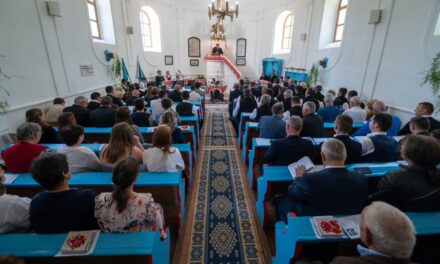The freedom fighter turns to the European Court of Human Rights, fighting for his rights, and the penman of the party state attacks him again on the side of the Romanian state power.
Since the occupation of Transylvania, the Romanian political elite has treated the native Hungarian community as a hostile entity, and accordingly, it has used a wide range of tools to try to eradicate it. An important part of this is spiritual, ideological and psychological warfare.
This was the aim of the introduction of the caning penalty during the First World War, the rioting of the Maniu Guards, the pogrom in Marosvásárhely, and the discriminatory deployment of law enforcement agencies, see for example the conceptual trials in the case of the police lynchings in Oroszhegy, Zetelak and Kézdivásárhely, or the stark fact that the pogrom in Marosvásárhely after Pál Cseresznyés to Béla Puczi, they did not condemn the initiators of the conflict, but the defending Hungarians and Gypsies.
Part of this warfare is that both media propaganda and education policy are designed to hide, deny, and misrepresent Hungarian achievements, or if it is linked to a person born in the area under Romanian rule, then to present that person as Romanian, be it Kőrösi About Sándor Csoma or today's successful athletes.
One can imagine how much of a problem the hero of the regime change, László Tőkés, presented to the Romanian consciousness-formers in this context.
Although he was born in Cluj-Napoca, he could not be considered a Romanian with the need to be taken seriously, so they had no choice but to buy it or programmatically discredit it, especially considering that the hero of Timișoara remained an active factor in public life, did not retreat behind the ecclesiastical ramparts, and even domestically and he used his international authority to publicize the painful reality regarding the fate of Transylvanian Hungarians, including the unvarnished statement of such uncomfortable truths as the fact that ethnic cleansing is taking place in Transylvania through subtle means.
In addition to all of this, he also announced a program, for more than thirty years he has been holding high the banner of Transylvania's autonomy aspirations, as the honorary president of the RMDSZ until 2003, and since 2003 as the head of the Transylvanian Hungarian National Council (EMNT).
The authorities in Bucharest had no chance of buying László Tőkés, which was probably assessed by the authorities in time. But the discrediting did not go easily and efficiently either, since the freedom fighter, who in the meantime won the position of bishop, was essentially unassailable. He was not involved in financial scandals, he always represented the same politically, he could not be considered a wind-cock, and not only was he never an extremist, but he was not even a radical.
He always stood on the basis of the ideas of national conservatism, if we look for his value model in the history of Hungarian ideas, the spirit of his writings, speeches, and political positions evokes the nationally committed libertarian conservatism of István Bethlen.
So what could be done?
All the more to belittle his historical role, smear him with accusations of sexism, and attempt to set him up as an extremist without any basis. The latter was relatively successful, at least in relation to the majority of Romanians, which is based on the fact that, just as anyone who dares to think differently from them is a fascist for those who call themselves liberals, so also for Romanians, any Hungarian who does not surrender is an extremist. who is proud of his identity, which he wants to preserve, who wants to create a Hungarian national self-government in Transylvania based on the principle of self-determination.
They are also not bothered by the fact that in Gyulafehérvár on December 1, 1918, they promised it to all fellow Transylvanian nations, which is why they branded László Tőkés and his autonomist followers as extremists.
In the meantime, the completely absurd sectarian slander was also refuted by the Romanian vetting committee, which can hardly be accused of a positive bias towards the Hungarians and László Tőkés, but even then they deployed this vile tool, which they won RMDSZ forces to distribute in the 1994-95 round, see Benedek Nagy's sexless attack on his own organization against its then honorary president, which action was supported from the background by the then leadership of the RMDSZ.
After all this, it was surprising that during the presidency of Traian Basescu, the number one exponent of the Hungarian autonomist camp in Transylvania received the "Star of Romania" order of merit on the occasion of the twentieth anniversary of the regime change.
Basescu is a typical Balkan politician who already in the 1990s revealed that he did not like the Hungarians at all, but he made several tactical concessions in their direction, see his actions in Tusványosi, or the fact that the Hungarian Civil Party was registered during his presidency. Accepting the order of merit was a gesture on the part of the recipient. At the time, there was some hope that an agreement could be reached with Traian Basescu on important national strategic issues based on mutual benefits.
Four years later, after his presentation in Tusványós, in response to a question, László Tőkés raised the idea that Hungary, following the Austrian-Italian model, should assume the status of a protectorate over the Transylvanian Hungarians.
By the way, this demand has been circulating among the national autonomist forces for almost two decades, it was first formulated by the Christian-conservative platform Transylvanian Hungarian Initiative in the mid-nineties. The Romanian press stirred up a scandal from the case, as a result of which the competent forum recommended depriving László Tőkés of the order of merit in question.
Traian Basescu was not willing to do this, and the shameful gesture was ultimately linked to Klaus Johannis.
The president of EMNT did not leave the matter at that, he started a lawsuit, which was concluded the other day.
The Supreme Court of Appeal rejected the claim
The press office of László Tőkés calls the decision a mockery of the rule of law in the statement issued on the case, and points out the absurdity of the fact that former Social Democrat ministers Ecaterina Andronescu and Gabriela Firea were allowed to participate in the evaluation of their own complaints in the ethical board, and also that the objectionable statements fit well within the scope of expressing a political opinion, and they are not considered an "unworthy act" for which one can be deprived of the award.
And just as in the political life of the motherland, there are those who support and do things against the country, whether it is about money from Brussels, migration or population growth,
In Transylvania there was also a pen-twirler, named Ervin Székely, who shamelessly mocked the failure of László Tőkés and the mockery of truth and justice.
The former member of parliament was one of those who was always a loyal soldier of the Neptunist wing, in 1995 he refused to distance himself from László Tőkés, calling him a servant of the devil, an informer and a disloyal handler, Benedek Nagy noted with disgust, and in 2004 he found himself saying that perhaps even Hitler himself would not have dared to come up with a plan like the one presented by the representatives of the Civic Wing within the RMDSZ in the parliament. The largely Euro-compliant autonomy statute in question was formulated along working models, and Ervin Székely, as a lawyer and RMDSZ member of parliament, would have had the duty to defend the draft and not attempt to discredit it.
But we can go back even further in time.
Thirty-five years ago, on September 6, 1988, at the administrative meeting of the Temesvár Diocese of the Nagyvárad Reformed Church District, as it was then called, the clergy protested the destruction of the village in an appeal on the initiative of János Molnár and László Tőkés. This memorandum was the only local, organized, public and corporate action against the Romanian government's cultural genocide project, euphemized as a "territorial planning plan". Those who voted for this could count on the power's retort.
During this time, Ervin Székely wrote dozens of linear articles in the newspaper Ifjúmünkas as a party propagandist. In his view, to quote just one of his easily retrievable stomach-churning texts, Comrade Nicolae Ceausescu was "the hero of the new agrarian revolution", "who marked out the path for the development of our socialist agriculture with scientific competence".
Well, that's how we stand. The freedom fighter turns to the European Court of Human Rights, fighting for his rights, and the penman of the party state attacks him again on the side of the Romanian state power.
Everyone gives what is their essence.
Attila Zsolt Barber/Hungarian Nation
Featured image: Transylvanian Hungarian National Council












